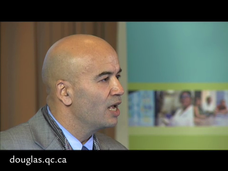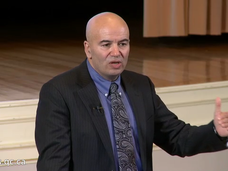In Canada, one in every one hundred people is diagnosed with schizophrenia. It is found worldwide in people of all races, cultures, and social classes.
Schizophrenia is a serious, chronic, and highly complex mental disorder. It can profoundly disturb how people feel, think, and react to those around them. People with schizophrenia may see, hear, or feel things that aren't there, or become confused, paranoid, or withdrawn.
Although there is no cure yet, schizophrenia is highly treatable. With early detection and ongoing treatment, many affected people can enjoy full and productive lives.
Symptoms of schizophrenia

Schizophrenia is a brain disease resulting from an imbalance in chemical systems of the brain. Schizophrenia does not mean having a split personality.
Symptoms usually develop gradually, but can also appear suddenly. Friends and family often notice the symptoms first.
Symptoms may include:
- delusions: believing people are plotting against them
- hallucinations: hearing or seeing things that are not there); disorganized behaviour
- changes in reactivity to the environment
- lack of expression or emotion
- poor concentration
- speech that is short and missing details
- difficulty planning to achieve goals
- memory problems
- confused thinking and speech
- difficulty carrying on a conversation
- repetitive movements such as pacing
- behaviour that does not make sense.
Affected people can become depressed or have mood swings, as with bipolar disorder. They also face an increased risk for suicide.
Mini-Psych School videos
| Delusions about schizophrenia and psychosis (2009) | Can psychosis be prevented? (2012) |
Watch other Mini-Psych School lectures.
Causes of schizophrenia
Researchers do not yet know what causes schizophrenia. It seems to be the result of a combination of problems, including genetic vulnerability and environmental factors. For exemple, there is a greater chance of having schizophrenia if a family member has the illness.
Schizophrenia affects men and women in equal numbers and tends to first appear at a young age (men aged 16-25 and women 16-35)
Are people with schizophrenia violent?
The vast majority of people with schizophrenia are not violent. Instead, they will more likely be withdrawn and prefer to be left alone. Substance abuse, or the presence of paranoid and psychotic
symptoms, can increase the risk of violence.
Treatments of schizophrenia
- Early treatment is vital. This dramatically increases the chance of a full or near-full recovery
- Highly-effective treatments are available, including antipsychotic medication, supportive psychotherapy, skills training, family support and education
- To avoid relapses, it is important to follow the prescribed treatment and receive adequate psychosocial support
Research at the Douglas
Schizophrenia and neurodevelopmental disorders is one of the 4 research themes of the Douglas Institute. The following Douglas scientists specialize in schizophrenia research:
Need help ?
Anyone meeting the requirements may contact PEPP-Montréal directly. A screening clinician will respond within three working days. For contact information, consult the PEPP page.
Family members may also consult the community resources like avantdecraquer.com




